Nigel Bird's Blog, page 6
May 29, 2024
One Man's Opinion: MOCKINGBIRD by WALTER TEVIS
.
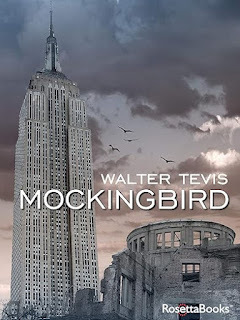
The fruit is still sitting there. I want it to mean something, but it doesn't.
A couple of weeks ago, I visited my eldest daughter in Utrecht. She took me to an Aldi supermarket there. We filled our shopping bags and, before leaving, stood in a circle next to a payment machine. The invisible scanner totalled up all the items we'd bought and charged us appropriately. I checked the receipt to make sure and it was spot on. To a man of my age and time, this should be mind-blowing, though I'm so used to all the amazing technologies of the world that it was only a minor thrill.
I wonder what mind-bending technology got Walter Tevis imagining the future. Whatever it was, I'm extremely grateful for its existence.
Mockingbird tells the story of a possible outcome. Given the challenges that we face with the rapid grown in AI, perhaps this is a book everyone should be reading. It would certainly give them a pause for thought. A moment to take a breath and try and work out what kind of world we might want to aim towards. Surely that would be a sensible thing to do.
Then again, this is only a work of fiction.
"The first models of thought buses...broadcast music or pleasant thoughts into the heads of their passengers. Some of the night runs would send out erotic thoughts."
"Why don't they do that anymore? The equipment broke down?"
"No," he said. "As I told you...they don't break down. What happened was that nobody would get off the buses."
Bentley is different to most of what is left of the human population. He has learned to read, something that doesn't go unnoticed by the Make Nine robot, Spofforth, the most perfect machine ever created who rules New York and maybe the rest of the planet. Spofforth hires Bentley to interpret the captions of ancient silent movies, a job that suits Bentley down to the ground.
Unfortunately, the curiosity in human history that being literate kindles add to his levels of dissatisfaction and confusion about the nature of life. To find head space he visits the zoo. After a number of trips, it becomes clear that the setup is fake. The animals are always on the move and entertaining and there are always three children there eating ice creams. These children also happen to be the only children Bentley has ever seen.
There also a beautiful woman living in the reptile house and it turns out she's real. She's also unusual in that she's given up taking the drugs that are freely on offer and prefers, instead, to experience life as an outcast.
It's not long before Bentley is teaching Mary Lou to interpret text. She's far brighter than he is and picks it up quickly. When they later move in together and discover an ancient library, they have a new landscape to explore, one that takes them away from the isolated individuals who now form the population, the monotony of existence and the regular group suicides that occur on a regularly around the city.
As their relationship grows, Spofforth is a constant observer. The human echoes in his machine mind create a desire in him that, as leader of all things, is easy for him to satisfy.
The novel is told through the three central characters, mainly in journal form. This allows a real exploration of the thoughts of the protagonists as well as generating a driving plot that's always engaging.
Mockingbird has really got me thinking about what lies ahead. Most of all, it has really shown me that there's no way I can visualise the distant future and what it might bring. In place of my own imagination, this novel has taken over. A world where humans are in deep decline and are on the brink of extinction, that's not a hugely unique vision. A place where robots have taken over, do all the thinking, producing and legislating, that's not so farfetched either. What I haven't really pictured before is a planet where the humans have failed and, because they have been unable to maintain any symbiotic relationship with people, so have the robots.
There are so many facets to Mockingbird and it's such a big story that I don't feel I can do it justice. It's the kind of book that it would be great to talk about in a bar or on a walk or in a book group. Other than the elements of the opening where I was slightly put off by the information and explanations, I was totally absorbed.
Among many other things, it's a reminder of the wonder of reading. The way pages can sometimes be mirrors to gaze into; the link it gives us with other minds; he connections to places and histories that we would never ordinarily get to visit; and the range of emotions it can evoke without leaving the comfort of our homes.
Three days now I've been sitting on this thought bus. I'm delighted that I finally reached my destination, but now have a thirst for travel and want to hop right back on.
Ding Ding, next stop All The Sinners Bleed by SA Cosby
"Why are you all so...so pleasant?" I said.
"We all are," the bus said. "All thought buses are pleasant. We were all programmed with Kind Feelings and we like our work.'
"That's better programming than people get," I thought with some vehemence.
"Yes," the bus said. "Yes it is."
May 25, 2024
One Man's Opinion: THE MAHE CIRCLE by GEORGES SIMENON
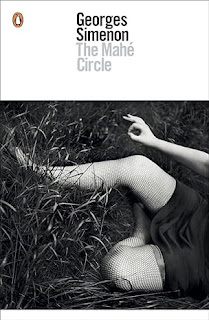 'That man there, I'll tell you what it is about him. He's tired of being in his skin!'
'That man there, I'll tell you what it is about him. He's tired of being in his skin!'Dr Mahe takes a holiday with his family on Porquerolles. The charm of the island and a mundane order of its residents are so removed from his own existence, that he finds them oddly captivating.
His obsession with the place grows when he is called to help a dying woman who lives in poverty in the locality. While attending, he becomes captivated by the woman's eldest daughter, a young thing in a red dress.
Said obession grows out of all proportion and worsens on each return to the island. As he becomes increasingly accepted as part of the fabric of the community, his psyche unravels, crumbling as his unhealthy relationships with the women in his life rot away his insides.
I didn't find this a pleasurable read. The subject matter isn't easy to digest and it's not easy watching such a cold and unbalanced human being dissolve before your eyes.
All a bit too bleak and harrowing for my taste these days and perhaps overblown and overwritten in some ways. The journey of the decline isn't one I'd wish upon others, but if you go in knowing it's not going to be easy, perhaps you be able to ride those glistening waves better than I (or Mahe) managed.
May 23, 2024
One Man's Opinion: THE MAN WHO FELL TO EARTH by WALTER TEVIS
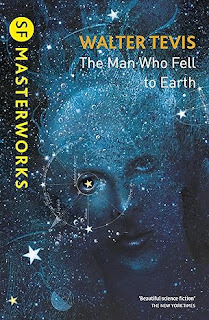
'There were certain things to be said in favour of drinking in the mornings. He had discovered, quite by accident, that it could be a fine thing, on a grey, dismal morning, - a morning of limp, oyster-coloured weather - to be gently, but firmly drunk, making a pleasure of melancholy.'
Having listened to the fabulous radio drama of the book over at bbc sounds, I couldn't resist giving the book a read and I'm so glad I did. It arrived on Monday in the post and I dived straight in.
The novel was published just before I was born and so, in many ways, is dealing with a period of time that I don't fully know. That said, the state of the world's health and the precarious nature of civilisation now and during my lifetime haven't changed a great deal and we may still require help as a species if we're going to find the best way forward.
I'm sure many of you have been here already, but for those who haven't, Newton appears on Earth selling diamond rings to raise funds. With apparent ease, he sets up in business with a patent specialist and sets about putting his plan into action. After accumulating many millions of dollars, he begins his project: the building of a spaceship that he intends to send to his planet Anthea to save whoever is left and bring them here. Anthea has suffered from endless wars that have all but desroyed Newton's home and the making of this ship is a last-gasp attemtp to rescue his people.
In order to protect himself from the public eye, he becomes close to only a few. There's Betty Jo, a nurse/housekeeper who has a simple charm, warmth and plain way about her, and Nathan Bryce, a chemist who worked for a time with Oppenheimer to help produce nuclear weapons and who has since struggled to find meaning or forgiveness in his life. They're excellent foils for Newton and, because each of them like a tipple, Newton soon becomes addicted to alcohol.
Of course, humans being humans, it's never going to be easy for Newton to complete his mission. Greed, suspicion, arrogance and a lust for power provide significant obstacles. These obstacles are the developments you'll need to discover for yourself.
Tevis sets all this up with aparent ease. There's never a moment where belief needs to be suspended and I was hooked from the wonderful opening. He builds up the conflicts and plot in terrific style, jumping between points of view and layering the characters beautifully.
Newton is quite someting. He possesses a gentle grace and brittle charm that is absolutely endearing. His thinking patterns and way of being make him vulnerable. His knowledge and love of art, history and culture allows him to develop a genuine fondness for the human species, in spite of all its flaws. His brittle frame and love of solitude, the sense of alienation he carries with such stoicism, the delicate phrasing of his words, the insight and the existential angst that trouble him endlessly, that love of the anaesthetic that is drink, all of these things make him a tragic and noble figure. For me, there are faint echoes of Gatsby and Nick Carrway in the relationship between Newton and Bryce, but that could simply be because of the gin and martinis.
And what's it all about? The meaning of life, perhaps. A warning about the hazards of filling the world with weapons and putting them in the hands of complete and utter nutters. A reminder that the world's resources are pretty special and that we're lucky to have them. The human condition. A mention that, to many of us, life makes no sense and yet we need to find purpose. A hint that if we can't find purpose, there are positive and negative ways in which we can distract ourselves. A celebration of the things that people have created in art and science. A reminder that dignity and honesty are qualities that should go a long way. And perhaps there's another message in there about looking after those who are differnent that ourselves, to give people space and room to breathe, remember that everyone is carrying packs of different weights and sizes and if we can help share that load along the way, it might just be a very good thing.
Whatever the main themes, I adored it. There were a couple of chapters of introspection that put the brakes on the story more than I'd have liked, but that's a minor point.
Pure class.
First thing I did once I got over the emotional turbulence created by the ending was to order a copy of Mockingbird from the library. The sooner it gets across the county and into my hands, the better.
May 19, 2024
One Man's Opinion: BLOOD RELATIVES by ED McBAIN
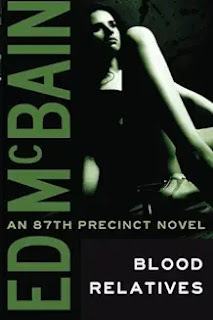
'Despite whatever the National Rifle Association had to say about man's inherent right to bear arms and to go romping in the woods in search of game, Carella (and every other cop in the city) would have liked nothing better than a law forbidding private citizens to own or carry a gun of any kind for any purpose whatever. But police officers did not have a powerful lobby in Washington, even though they were the ones who daily reaped the whirlwind while the gun manufacturers reaped in the profits.'
Patricia staggers along to the police station, hands and face slashed by a blade. Not too far away, her cousin lies dead in a pool of her own blood.
Because Patricia survives, there's an eye witness to the murder and a line up is arranged. Because of the outcome of the line up, Patricia creates a new story which offers a truth that her family find impossible to digest, given that it names her brother as the killer.
Not only is the brother fingered for the crime, he's also accused of sexual acts unbecoming Blood Relations.
This one was an interesting read for me.
First of all, I read it in a day. I can't remember the last time I completed a novel in such a short time. Maybe that's because I have time on my hands just now or perhaps it's due to the page-turning nature of the story. Both are probably true.
It's also unusual in that I managed to identify the killer by page 30. It's not like me to be so sharp in this respect and I couldn't wait to find out if I'd correctly cracked the case.
Blood Relatives tells an intriguing story. It's laden with sexual intrigue and language and delves deep into the darkness when required. It's also heavy in terms of the procedural references and explanations. I always appreciate McBain's legal asides as they often add authenticity to the police work. In the case of this novel, I feel he's taken a step too far in that department. It's as if the publisher asked him to throw in extra facts for the readership. This doesn't spoil the story significantly and, on occasions adds a smile, but it was a little much for me as it slowed the pace down just when I didn't want it to.
That said, it's an excellent story and Steve Carella is in excellent form, dolling out justice in his own way and wishing he could deal out more for crimes yet to be commited.
A healthy 7 out of 10.
May 16, 2024
THE MAN WHO FELL TO EARTH
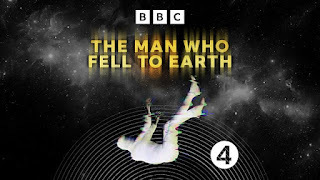
My lovely car share friend recommended this to me on Monday and I'm so glad she did (thanks Emily).
It's a cracking adaptation of The Man Who Fell To Earth and is available over at BBC Radio.
I've not read the book, but loved it so much that I decided that I'll put that right very soon.
Excellent work.
May 12, 2024
One Man's Opinion: BREAD by ED McBAIN
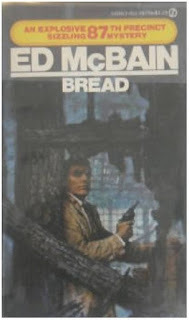
Bread is a belter of a book. It's great on a couple of fronts. First of all, the case being investigated is wide and complex. There are a lot of bodies and there's plenty of detection. Secondly, the chemistry of the detectives is effervescent, what with the return of Cotton Hawes and the need for he and Carella to work alongside Ollie Weeks from the 83rd.
It's August and it's hot. Many of the 87th are on vacation, which is why Roger Grimm is forced to come in to the station when the detective handling the case (Andy Parker) of his torched warehouse leaves the investigation to take his break.
Grimm needs a speedy resolution to the arson case in order to convince the insurance companies to pay up so that he can buy his next shipment of small wooden animals and make a killing when he sells them on. Carella's sympathetic to Grimm's cause, after all there would be no logic to Grimm burning his own stock given the way the circumstances are explained.
The only problem is, to proceed with the case, Carella needs to go to speak to Parker. Parker's no friend of Carella at the best of times. Given that he's at home in his shorts and vest with a beer in his hand, he's less inclined to talk about police work than ever. He's the bad apple in the force- violent, opinionated, lazy and racist, to name but a few of his traits. He talks a good game on this one, but when Carella follows up, it's clear that Parker has given his usual below-par minimum.
After Grimm's home is also torched, Carella and Hawes dig deep. In doing so, they set off a chain reaction that make the threads of the case difficult to hold. One of the them is the murder of a suspect in the case, a junkie who wears fine suits and drives a Cadillac, which happens to be in the territory of the 83rd.
Enter Ollie Weeks (aka Big Ollie, aka Fat Ollie), a huge man with personal hygiene issues and a streak of racism running through him that's as wide as he is broad. He digs into a new element of the case, a financial institution looking to clean up Diamondback's slums. He also digs deep into the patience of liberal-minded Cotton Hawes who finds the new working set-up intolerable. It's only Carella who manages to keep Hawes on the case, explaining that while Weeks might be a pig, he also happens to be a tenacious detective with a range of skills that will be useful during this investigation.
The three work together, bringing those threads together to form a curious tapestry.
There's little to be said without giving away spoilers, but suffice to say the interview room set pieces are top drawer and the psychological angles employed by the detectives are spot on.
A great case, then, and fabulous entertainment.
The question is, will we see Ollie Weeks again? Part of me, like Carella and Hawes, hopes he'll disappear into the mist. The other part thinks he's a great asset to the books and the needles he pokes his colleagues with add a nice dose of spice to the series.
May 8, 2024
One Man's Opinion: THE DOOMSTERS by ROSS MACDONALD
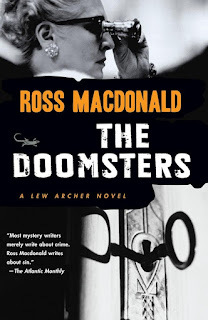
'The fathers have eaten sour grapes, and the children's teeth are set on edge.'
After I was about a third of the way into this book, I realised that I want my next writing to be in the first person. That desire has something to do with the quips and internal thoughts of Lou Archer, the private investigator protagonist of The Doomsters. I loved the way his descriptions and thoughts are so well outlined and feel that it's because it's in his own words that the crisp cutting edge really works. Which, I guess, gives a strong indication that I enjoyed this book quite a lot.
It has a cracking opening. Carl Hallman, on the run from a psychiatric institution, knocks on the door and asks for help. Hallman is believed to be central to the deaths of his parents, but he has recently come into some information about the family doctor that has set alarm bells ringing wildly in his head. He needs help to delve further into the mire of his past in order to liberate himself from a personal torture.
Archer persuades Hallman to return to the hospital for treatment, promising to work the case while Hallman continues to recover, only on the way back, Hallman knocks him out and steals his car.
That would normally be enough to put a person off, but Archer is attracted to the man's desperation and to the sense that there has been an injustice somewhere along the way that needs righting.
Cue a visit to the Hallman ranch.
The police are out in force awaiting Carl's return. Though there's a policy to take Carl alive, Archer isn't so sure that will be the outcome. He sticks around to meet the other players in Carl's life: his loyal wife, his stoic brother, his sister-in-law and daughter, the family doctor (aka the sister-in-law's lover), the cops and some of the help.
To further the complexity of the case, there's an element of personal involvement for Archer as the junkie who escaped with Hallman happens to be one of Archer's failed projects from way back.
The whole murky pond is full of these sharks who appear to have their eyes on the same prize- the Hallman family fortune.
Needless to say, there's a whole lot of unpicking to be done. While at work, we get to explore the flaws of the family and, perhaps more significantly, the detective doing the digging, which makes this one hell of a journey.
The opening is terrific. The build-up gathers at a pleasing pace. Each individual scene is masterfully handled. Layers are peeled away and added with ease. The bleak explorations into the human condition have real impact. In all these respects, it's excellent.
A few tiny issues. To my mind, there are so many strings to unravel that things became confusing at times and I had to think hard. And the denouement comes in the form of a big reveal, a huge exposition explaining everything away (much as this worked, it also left no room for the this reader's personal satisfaction of being on the right trail at some point along the way).
Lots to love, then, and much to reflect upon.
And regardless of that ending, I'm definitely diving in to write in the first person when my next idea comes along.
May 6, 2024
Mind The Gap

It often happens this way. I've chipped away at a work in progress, smoothed off the rough edges, roughed up the smooth. It's been hard work to carry the story and to go with its flow, and then the end is in sight.
I love the feeling that it will all soon be over. That I'll finally have a finished draft and know how things eventually played out. It's one of those magical joys that deserves to be savoured and cherished, each moment treated with respect and reflection. And what do I do? Dash as quickly as I can without a care, like a child sprinting down a mountainside ignoring each and every peril.
The rush is amazing. Not quite the high of a drug or the buzz of a roller coaster, but not far off.
And there it is. Two week's writing crammed into twenty-four hours and it's all done. I can take a planned break to do some emotional and mental recharging.
Which is terrific, isn't it?
Just now I'm not so sure, which may be why I'm here trying to talk myself out of the anti-climax that comes post-completion.
On the face of it, I should be proud and delighted. I now have two finished novellas in the bag, both lying low for now. Without going into too much detail, they're collaborative pieces and the next layer of attention comes from elsewhere. I know they're both brilliant stories and I'm confident that the quality of prose is high. Having them there in the back pocket is a good feeling. One day they'll be released into the world and that will bring a new thrill all of its own.
But today sucks.
Bank Holiday Monday. No teaching to distract. No story to write. There's nothing to do but busy myself with the things I want to do.
Which is the problem.
What I want to do is write. To feed from the adrenaline coasting around my body from the delight of completion. Sketch out a short story or a poem, perhaps. Pick up the trail of something unfinished. Dive right back in and hide from whatever it is that writing allows me to ignore.
And yet, the sensible part of me knows that would be futile. It's the break I need and I'll be all the better for it once I can settle into the temporary rhythm that lies between stories.
So I'm twitching. Typing out this to keep my fingers busy. The washing's done, the bathrooms clean, I have a floor to mop and, later this afternoon, the steady beat of a walk will keep me sane.
It all makes me think of the announcement on the tube when the platform is that little bit further away from the train door that is usual. Be mindful of the gap between stories. Use the time well. If you have any tips on how to do that, I'm open to all advice.
April 18, 2024
The County Line
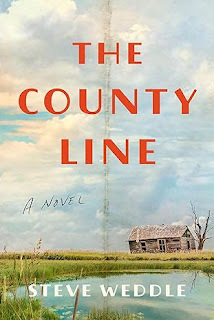
ONLY £1 in the UK today for this STEVE WEDDLE novel. A steal.
From Steve Weddle, the author who the New York Times calls “downright dazzling,”
April 3, 2024
One Man's Opinion: SADIE WHEN SHE DIED by ED McBAIN
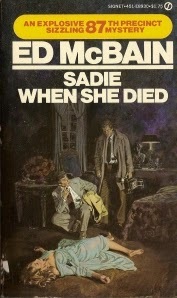
'Like a woman in her tenth month, the clouds over the city twisted and roiled in angry discomfort, but refused to deliver the promised snow.'
I was a little taken aback with this. In a recent 87th, I'm pretty sure I came across an old lady called Sadie and imagined she'd be the subject of this one. I couldn't have been more wrong.Sadie When She Died shouldn't be as good as it is. In some ways, it has a Columboesque feel in that we're pretty sure of our ground from the off.
Carella and Kling are working this, in the main. It's coming up to Christmas and the world is under pressure to buy gifts and be jolly. The cops, they need to find their pleasure in solving cases.
This one seems pretty open and shut. A well-to-do lawyer returns home following a burglary to find his wife has been stabbed. There are open windows and there's a trail of blood, prints and witnesses that means new technician Marshall Davies believes he'll have it wrapped up in no time. And he's right, only there's something off with the case. The husband, when interviewed at the scene tells Carella that he's 'very glad she's dead' and that he's 'delighted that someone killed her'.
Carella's spidey-sense prickles at that, as well it might, and because of that we know, just like he does, what has really happened.
Said husband proceeds to court and taunt Carella for reasons that are difficult to fathom, while Kling is stuck somewhere between trying to forge a new relationship with one of the case's witnesses while hoping to get back together with former sweetheart, Cindy.
We get to travel to some new places in Isola, viewing it from its top of the range to its bottom. There's a diary code to solve, a cop beating, a series of ex-lovers to be grilled and some great work from the technical team.
The way the personal and the professional lives of our detectives are wrapped together is a real treat. The case itself is intriguing though not intense, while Kling's relationship dilemmas bring a whole heap of tension to the party.
A load of fun.



